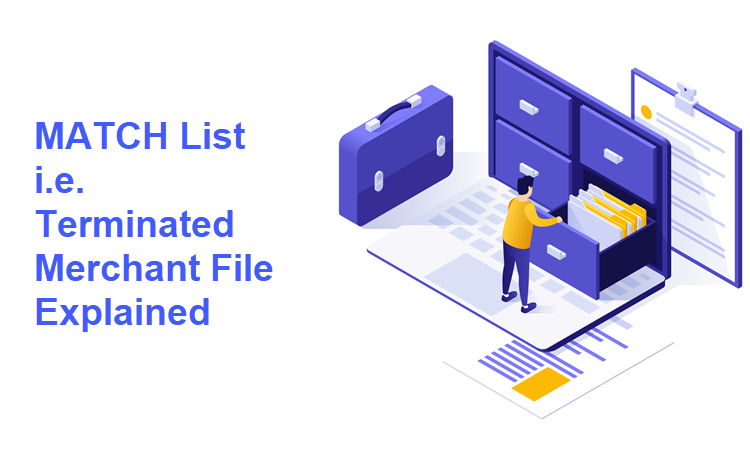When entering the world of payment processing, especially for high risk business, there are various roadblocks you may be met by on the way. It is not so simple setting up a merchant account – the process takes time and patience. There are screenings merchants accounts go through, rules that must be followed, laws that must be abided by. Therefore, it is crucial to understand what specific merchant payment processing terms mean – like the MATCH List or Terminated Merchant File.
What Is the MATCH list or Terminated Merchant File?
A MATCH List, or Terminated Merchant File (TMF), is a tool used by payment processing companies to screen potential merchant accounts before they are approved for processing. To be eligible to have a merchant account, it is essential to pass many tests along the way. This tool helps companies such as Mastercard identify high risk accounts or ones with multiple chargeback issues. If identified as such, they could get blacklisted and could even be prevented from creating a new account with a different payment processor.
Note: Learn how Mastercard revised their Specialty Merchant Registration requirements and implemented advanced measures to prevent unlawful activity in our article Mastercard Standards for Security Rules and Procedures Update.
Why Could You End Up on the Terminated Match File

While the actual reason for ending up on the MATCH list list may vary, it is always due to some activities performed by the merchant. Reasons can include multiple chargebacks, fraud, and money laundering, among others. These activities lead to high risks for acquiring bank, which may decide not to do business with you if they think it is too risky.
When this was first introduced, merchants would be added to the list for the littlest reasons. Nowadays, the rules have changed, and it takes a truly risky activity to land you on the list. Mastercard, for example, has a code table listing reasons why your merchant account could have gotten on the MATCH File:
- 01 Account Data Compromise
- 02 Common Point of Purchase
- 03 Laundering
- 04 Excessive Chargebacks
- 05 Excessive Fraud
- 07 Fraud Conviction
- 08 Mastercard Questionable Merchant Audit Program
- 09 Bankruptcy/Liquidation/Insolvency
- 10 Violation of Standards
- 11 Merchant Collusion
- 12 PCI-DSS Non-compliance
- 13 Illegal Transactions
- 14 Identity Theft
What to Do If You are Placed on the MATCH List?
You may be wondering: “How will I know if I’m added on the MATCH List (Terminated Match File)?” Chances are you will not know until you try to open a processing account with another payment company. For example, you may get added to the list by your previous payment processing company if you have ended things on bad terms.
Once you know you have been put on the list, the only way to get off it is through the company that put you there. Keep in mind that the company that put you on the list took on the risk of having you as a merchant and processing payments for you. So, the first step to take when you are added to the Terminated Merchant File list is to contact your processing company and identify why you are on it (if you do not already know).
Keeping your cool and being polite and understanding, you will eventually contact a person who might help you. This person will give you the answer to why you got on the list and how you could potentially be taken from it.
Please keep all your contacts written down, pen down everything they say. Getting off the MATCH list is no easy task, and depending on the reason you are on it, it might be impossible. Fraud is one example of an activity that will potentially not get you of the list.
Chargebacks might take a little longer, but they can be solved as long as you reduce your chargeback issues. No payment processor wants to have unsolved chargebacks building up. These cases are usually easier to solve when you are a new company.
How to Avoid Being Put on The MATCH List

The easiest way to prevent being put on the MATCH list is to find the right payment processor. With the appropriate payment processor, you will be guided through some of the high risk industry's no-noes and get a better understanding of how your business might get into trouble with an acquiring bank.
Of course, even with a payment processor, merchants must cooperate and abide by set rules and practices, maintaining standards and compliance, following regulations, handling fraud, and avoiding chargebacks.
Note: Some high risk payment processors can help take this load off your back by handling these for you.
While you cannot avoid things like chargebacks and fraud, there are ways to reduce them and control them. With an expert team from a well-known and trusted payment processor that can handle this for you, some of the reasons we've listed above that could put you on the MATCH List can be easily avoided (04 and 05, for example).
How to Get Off the MATCH List?
Once you have a clear understanding of what could land you on the MATCH list, you should consider how to remove yourself from the list if you get added. Due to the specificity of the situation, getting off the list will not be an easy task.
Getting off the list requires a minimum of five years, which might seem a little discouraging at first, but you could try and communicate with the bank that added you to the list. If your reason for being blacklisted is not severe, you might get your business removed. However, if you are accused of fraud, this might mean that you will have to accept your ill faith.
On the other hand, if you think you have been put on the MATCH list by mistake, this is then a job for the bank. You must report the error or even stolen identity to the bank, which will then need to investigate this situation, and once they conclude the activities were an error, you will be taken off the list.
Finally, you can be added to the list if you are not PCI compliant, which can be resolved by merely becoming PCI Compliant. Whatever the problem, the best solution is avoiding getting on the list in the first place.
Conclusion
Understanding what a MATCH list is and why you could get on it is half the effort to avoiding it. Likewise, knowing how to handle such a situation is vital to solving the issue if it arises. Being a merchant comes with its rewards, but also has its pitfalls. That's why it's crucial to get to know these before you get started, especially if you're planning on starting a high risk business.
